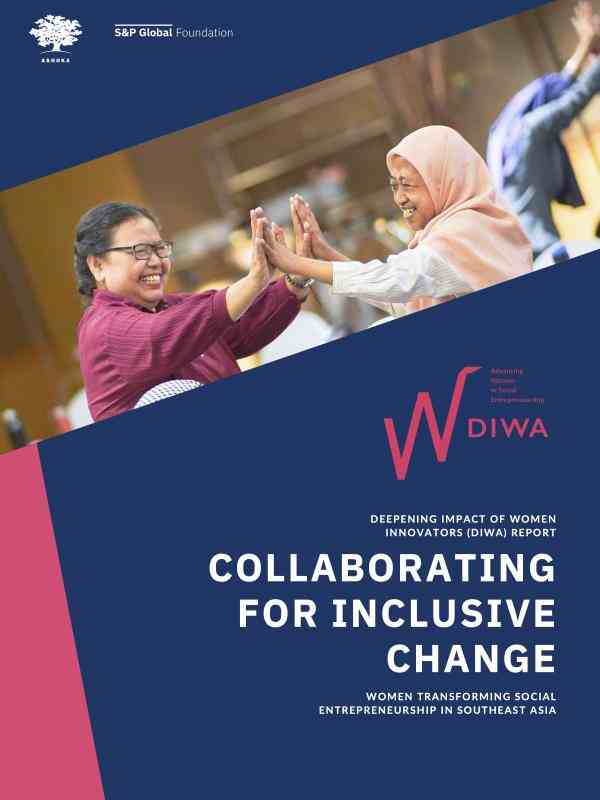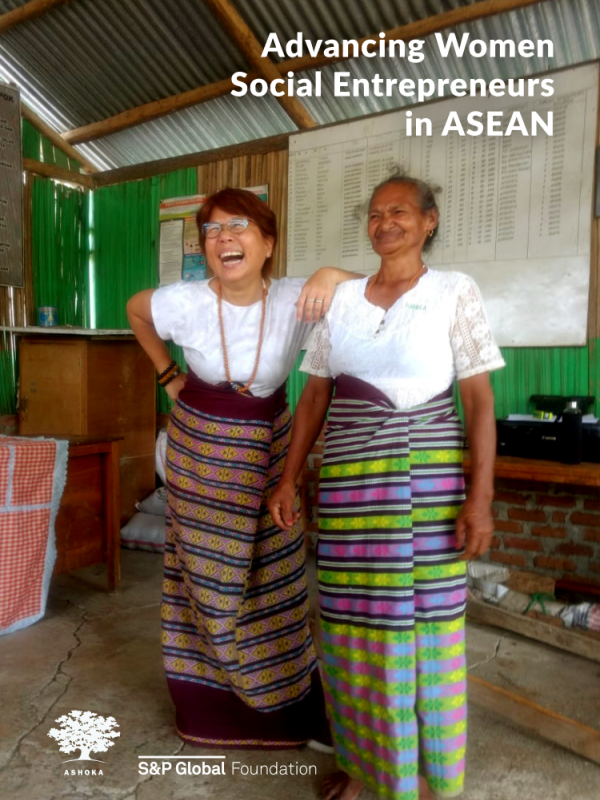Women social entrepreneurs (WSEs) have multiple burdens as leaders as well as caregivers in their families and communities. DIWA – The Deepening Impact for Women Activators program was initiated by Ashoka with the support of S&P Global Foundation to become a community of support and learning for WSEs in Southeast Asia. Since 2020, this program has supported more than 100 WSEs through sharpening their strategy and building a community of support so they can expand their impact in their respective fields while growing stronger together.
This report marks the past 4 years of collaboration among Ashoka, S&P Global Foundation, and the WSE communities to support the pivot to more inclusive change for the future.
The goal of this report is to identify the enablers and gaps in the field of women social entrepreneurship. It also aims to answer the following questions:
How does the Deepening Impact of Women Activators (DIWA) program contribute to the well-being, network, and leadership and professional skills of women social entrepreneurs in Southeast Asia?
What insights and recommendations will support Women Social Entrepreneurs (WSEs) in scaling their impact and catalyzing systemic change?
The Report launch featured remarks from Ashoka Southeast Asia Leaders Nani Zulminarni & Amelia Hapsari, and S&P Global Foundation President Cheryl Chen.
It contains stories told by DIWA WSEs representatives from Philippines, Indonesia, Thailand, Singapore, Malaysia and Vietnam.
We extend our heartfelt thanks to S&P Global Foundation for funding this collaborative project and to the beloved 111 Women Social Entrepreneurs in the Ashoka DIWA Community for being generous in sharing their findings, insights, and recommendations.
Aim of the Report
The goal of this report is to identify the critical gaps in the realm of Women Social Entrepreneurship, as well as promote what enables Women Social Entrepreneurs (WSEs). We have focused on the following questions:
-
How are WSEs in Southeast Asia innovating to generate social and economic value for their communities?
-
What are the key enablers that will support WSEs to scale their impact and serve as catalysts for system change?
This report is the outcome of...
-
150 quantitative surveys, including 40 men and 110 WSEs from ASEAN
-
30 in-depth interviews with Ashoka Fellows from Indonesia, Malaysia, Philippines, Singapore and Thailand
We analyzed the quantitative and qualitative data we gathered to arrive at the key insights presented in this report; here, we highlight uniquely female approaches (e.g. working towards inclusive communities and international replication of their work), common barriers (e.g. struggling to change policies and conditioned gender norms), recommendations on potential solutions and systemic change (e.g. improving funding, partnerships, and planning), as well as inspiring stories from WSEs in Indonesia, Malaysia, Philippines, Singapore and Thailand.
Contents
-
Part One: Landscape of Women Social Entrepreneurship in ASEAN
-
Part Two: Men and Women Social Entrepreneurs Are Not That Different
-
Part Three: Unique Challenges and Approaches in Women Social Entrepreneurship
-
Part Four: Reflections for the Future: Enablers for Both Men and Women Social Entrepreneurs, and Gender-Specific Support for Women Social Entrepreneurs
Recommended Highlights for Key Stakeholders
-
Social Entrepreneurs: Parts Two and Three include first-hand experiences of established WSEs and how they have successfully overcome challenges. These stories can be insightful for all genders, as well as both aspiring and established social entrepreneurs.
-
Investors and Funders: Parts Two and Three showcase the powerful work WSEs have been doing in this region, highlighting why it is important to invest in them. Part Four details the support that both men and Women Social Entrepreneurs need, such as how funding can help them.
-
Government: Part Three highlights WSEs’ struggles to hold conversations with policymakers, and Part Four lists what can be done to solve these issues.
-
Partners and Stakeholders: Part Four lists various ways that partners can work with social entrepreneurs to foster a mutually beneficial relationship.

